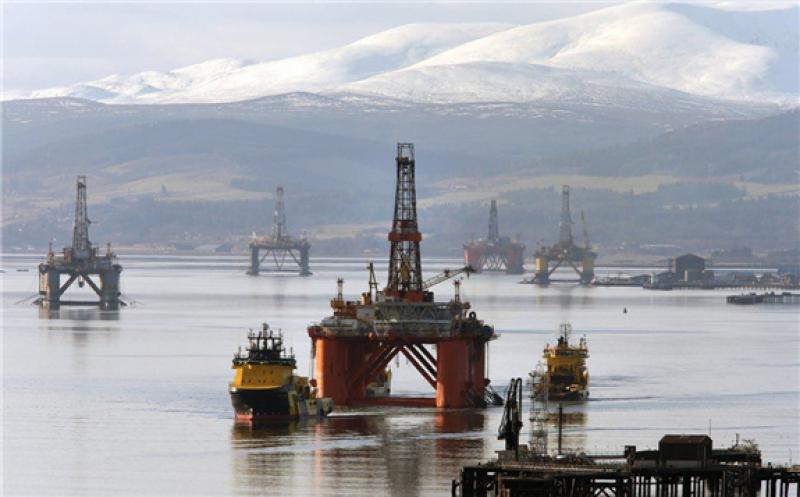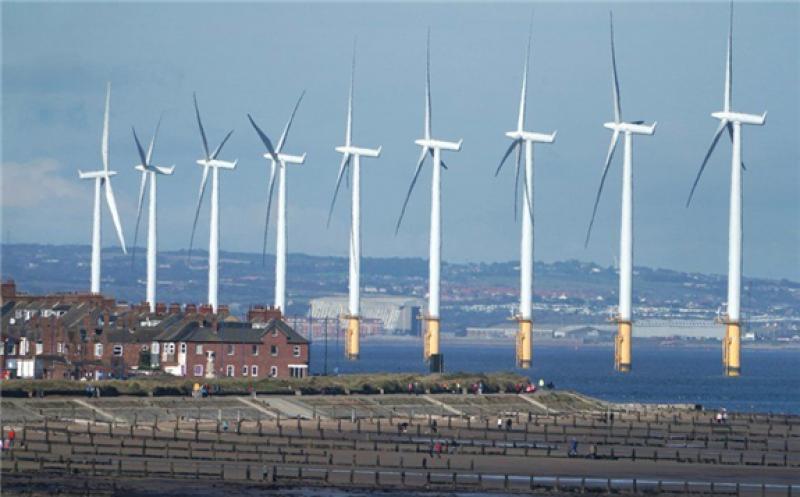More oil and gas wells are to be drilled in the North Sea, the UK government has announced.

The decision has angered environmental campaigners, who say the government should refuse new licences.
Ministers say permission to drill will be granted as part of a careful transition away from fossil fuels, safeguarding jobs and the economy.
But the environmentalists say that enough fossil fuels to ruin the climate have already been found.
In light of this, they say, the government should have refused the new licences.
They add that the decision undermines the UK position as leader of the vital UN climate conference in November, known as COP26.
But ministers insist that their strategy will work. So-called "checkpoints" will be introduced that take into account domestic demand for oil and gas, projected production levels, the increase in clean technologies such as offshore wind, and the sector’s progress in cutting emissions.
The sector will face targets to reduce emissions by 10% by 2025 and 25% by 2027. It is also committed to cut emissions by 50% by 2030.
It will be helped by joint government and private investment of up to £16bn by 2030.
This will include up to £10bn for hydrogen production and £3bn for a technology called carbon capture, usage and storage - where carbon emissions are either turned into other products such as plastics or buried.
The government says the deal should cut pollution by up to 60 million tonnes by 2030, while also supporting up to 40,000 jobs across the supply chain.
UK 'making a fool of itself'
Mel Evans from Greenpeace said: “This is a colossal failure. The UK will make a fool of itself in the run-up to hosting the COP26 global climate talks if our energy minister signs off on new oil and gas licences that serve to rip up the Paris Agreement (the world deal to hold global temperature rise to 1.5C).
“We know the government has already approved too much oil and gas extraction to meet our climate obligations under Paris, and the oil industry itself says that we’ve passed peak oil demand.”
Denmark recently announced a decision to reject new licences for oil drilling in the North Sea.
The UK Energy Secretary Kwasi Kwarteng said he would follow a different path: “Today, we are sending a clear message around the world that the UK will be a nation of clean energy.
“We will not leave oil and gas workers behind in the irreversible shift away from fossil fuels. We will power the green industrial revolution, turning its focus to the next-generation clean technologies the UK needs to support a green economy.”

He was supported by Deirdre Mitchie, chief executive of Oil and Gas UK, who told BBC News: “Ongoing exploration and production is compatible with net zero emissions – we’re pleased that the government has recognised this."
Net zero means reducing greenhouse emissions as much as possible and then balancing any that remain by absorbing an equivalent amount from the atmosphere.
Lang Banks, director of WWF Scotland, told BBC News: “Every new licence makes it more difficult to achieve the reductions we need and risks creating an even bigger ‘cliff edge’ for oil and gas workers.
“As climate science continues to be updated, it’s entirely possible that there’s going to have to be an even quicker tail-off in oil and gas production than is currently predicted.
“If we want the transition to be a fair one, then instead of wasting any more time opening up new fossil fuel reserves, efforts would be better used to more rapidly harness existing skills and direct them toward the zero-carbon industries we all need.”
Details have also been given about the UK’s previously-announced plans to stop funding overseas projects that directly support fossil fuels – that will now happen at the end of March.
It will see the UK cease export finance, aid funding and trade promotion for new crude oil, natural gas or thermal coal projects.
However, a controversial gas scheme in Mozambique will still go ahead because it has already been approved.
In the last four years, the government supported £21bn of UK oil and gas exports.
The need to protect workers in oil and gas has been stressed by an independent group studying Scotland’s transition to a clean economy.
The so-called Just Transition Commission warns that creating a near-zero carbon future means a fundamental transformation of the nation’s economy that must be implemented fairly.
It says the transition must be made by the people of Scotland, not done to the people of Scotland. And the shift must be a “national mission with social justice at its heart”.
The commission - recruited by the Scottish government from industry, trades unions and academia - says worker education and skills training will be vital.
It says the great move towards low carbon must be done in co-operation with the unions.
This article is reproduced at www.bbc.com